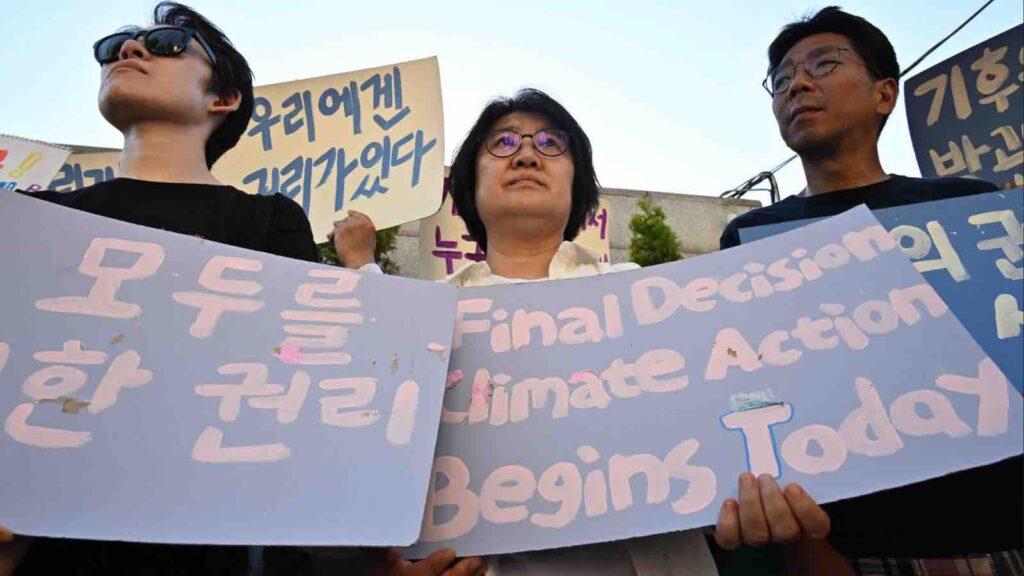Court’s decision highlights inadequate long-term climate targets in South Korea.
In a landmark ruling, South Korea’s constitutional court has declared that the country’s current climate law fails to adequately protect the constitutional rights of future generations. This decision marks the first time an Asian court has ruled that government action on climate change is insufficient, setting a significant precedent for future climate-related legal actions in the region.
RELEVANT SUSTAINABLE GOALS



The court found that the absence of legally binding targets for greenhouse gas reductions beyond 2031 violates the constitutional rights of future generations and fails to uphold the government’s duty to protect those rights. The ruling emphasizes that without long-term targets, the burden of addressing climate change is unfairly shifted to future generations. The court has given the national assembly and government until February 28, 2026, to amend the law and include these longer-term targets.
Echoes of Global Legal Movements
This decision echoes a similar ruling by Germany’s federal constitutional court in 2021, which found that Germany’s climate law lacked sufficient provisions for emission reductions beyond 2030, potentially infringing on the freedoms of future generations. South Korea’s ruling reinforces a growing global legal trend that holds governments accountable for the long-term impacts of their climate policies.
South Korea’s climate litigation began in March 2020 when Youth 4 Climate Action, a group aligned with the global school climate strike movement, filed the first lawsuit. The group argued that the government’s inadequate greenhouse gas reduction targets violated citizens’ fundamental rights, particularly those of future generations. Over time, three additional lawsuits were consolidated, bringing the number of plaintiffs to 255, representing a broad spectrum of ages—including children, babies, and even a fetus at the time of filing.
A New Push for Ambitious Climate Action
Activists, including Kim Seo-gyeong from Youth 4 Climate Action, view the court’s decision as a catalyst for renewed efforts toward more ambitious climate action. “Responding to the climate crisis means reducing its risks, controlling factors that could exacerbate the crisis, and building safety nets to sustain life and society,” Kim said. “I look forward to seeing how this constitutional complaint will change the standards for climate response and what transformations it will bring.”
Among the plaintiffs was 12-year-old Jeah Han, who was part of the “baby climate litigation” group consisting of young children and babies represented by their parents. She expressed joy over the ruling, saying, “I have always believed that this complaint represented the wishes of many people. Today’s outcome feels like a wish has come true, and I am both happy and proud. Just as we have come together to fight for a better future amid the climate crisis, I hope more people will join us moving forward.”
Partial Victory: Court Rejects Challenge to 2030 Targets
While the court recognized the inadequacy of long-term targets, it rejected the plaintiffs’ claim that the government’s 2030 goal of reducing greenhouse gas emissions by 40% from 2018 levels, as outlined in the carbon neutrality act, violated constitutional rights. The court deemed this near-term target sufficient.
Following the verdict, the plaintiffs released a joint statement expressing mixed feelings: “There is some disappointment regarding the parts that were not upheld today. However, it is clear that today’s ruling represents meaningful progress in protecting everyone’s rights beyond the climate crisis. The decision we face today is not just a victory for the plaintiffs who filed the lawsuit; it is an achievement for all those who have been excluded from the national climate response process while confronting the climate crisis.”
Implications for Future Climate Policies
Sejong Youn, a solicitor who has represented all four litigation cases, highlighted the core issue of the ruling: the unconstitutionality of reduction targets that impose an excessive burden without considering the rights of future generations. “A new greenhouse gas reduction pathway that addresses this unconstitutionality must be presented within the timeframe set by the constitutional court,” he said.
The historic decision is expected to have repercussions beyond South Korea, potentially influencing climate litigation and policy in other Asian countries, including Japan and Taiwan, where similar cases are currently under way. As the first court in Asia to hold a government accountable for insufficient climate action, South Korea’s ruling could inspire further legal challenges and drive more ambitious climate policies across the region.
You may also be interested in :
Lead image South Korean climate campaigners outside the constitutional court in Seoul. Photograph: Anthony Wallace/AFP/Getty Images


